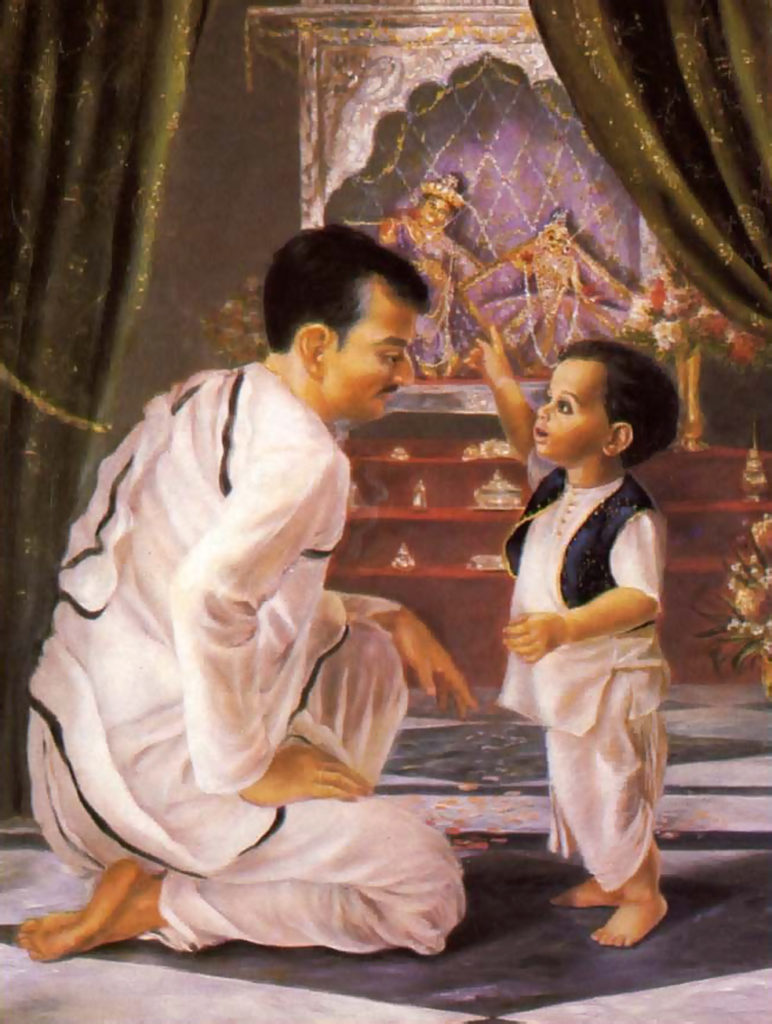I used to think that educating children was a very complicated thing. Later I learned however that it’s actually much simpler than I thought.
When we think about educating a child, we think about teaching a child to act like an adult. When we go on this path it can quickly become a complicated affair, because just like we have an ego, children also have their ego, and often this approach leads to a conflict between the two. Children who grow up in this way will also notice any kind of discrepancy between the rules imposed by the parents and the way they act, and such discrepancies lead to resentment. As a result, children often grow up averse to following authority, and this leads to more serious problems when they become teenagers. This also creates problems for them in accepting a spiritual master and practicing other aspects of devotional service.
There is however another approach, that is actually more in line with what the Vedas teach. What is it?
Instead of trying to teach the child to be an adult, we should act as adults ourselves!

It may sound obvious, but that’s actually quite different from what we often do. Frequently we are not able to control our emotions, we fight with our spouses and other people, we eat the wrong things, and at irregular times, we act in selfish ways, we are impolite with people, and so on. We do everything that we try to teach children not to do, and as a result, they become resistant and very quickly lose faith in us as authorities. When we try to force the children to do things we ourselves are not properly doing, it becomes a simple process of repression.
Once a senior devotee told me one story of his childhood. When he was a small child, 4 or 5 years old he went with his parents to a nearby country by car. They bought several products there, including a big cheese. On the way back, the border guards asked about what they were bringing, and the father showed a few products that were exempt from tax. The border guard asked if there was anything more and he said no. At this moment the child innocently said: no papa, there is also that cheese! They ended up having to pay a lot in taxes. When they arrived home the father slapped him, he was fuming. The boy cried saying that he taught him to always tell the truth! The father became even angrier and chastised him severely. After that, he said, he had to reexamine the role of his father as an authority in his life.
Children are extremely efficient in analyzing situations and noticing discrepancies. They can be even sharper than adults in this area. They rarely agree to follow someone who is not walking his talk, even if this person is the father or mother. We can say that children don’t follow what we say, they follow what we do.
When we start acting like adults ourselves, acting in an exemplary way, the children start to automatically learn from our behavior. When this happens, it becomes much easier to keep them on the right path. We can see that the Vedic system of education is based on having teachers with exemplary character, and of course, the parents are the first teachers.
Another component of the Vedic educational system is love and trust. Children need love to grow and develop appropriately. Only when they feel safe and protected they can have the confidence to explore their surroundings and learn. Therefore, caregivers need to love the children under their care.
This was one of the greatest mistakes in the early gurukulas in our movement, for example. In Vedic gurukulas, married Brahmanas would open small schools and would basically accept the children as part of their family. The wife would take care of them as her own children, even bathing and dressing them, and the husband would teach them the sastras. The boys studying in the Vedic gurukulas would thus not be deprived of an environment of love and trust. The children would see the brahmana and the wife as role models and would do their best to follow their example, and thus they would grow into responsible and devoted adults, capable of passing these qualities to their own children.
In our early gurukulas, however, it was common for renunciants to be put in charge of the children, often young brahmacaris with very little life experience who were struggling to control their own senses and minds. They didn’t have a bond of love with the children, and thus the whole thing would often derail into a mere system of bullying, where the teachers would mistreat the children and the older children, learning from the example of the teachers, would bully the smaller children, creating a completely hellish system that was the opposite of what Prabhupada was teaching.
This failed experience led to a widespread rejection of the gurukula system and the parents themselves taking charge of their children’s education. The problem is that most of us are victims of bad education ourselves, and thus we don’t know how to properly raise children either. Each of us has our own stereotyped ideas, and they do not always work. As a result, we again see that many of our children grow up as problematic teenagers and often reject the path of devotional service later in life. As in many other aspects of our devotional life, that’s something we need to learn, and that’s a process that demands a lot of reflection and introspection.
